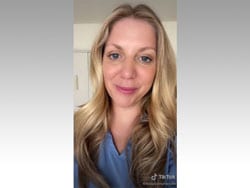Life at the Deathbed: Hospice Nurse’s TikTok Posts Go Viral
Hospice Nurse Julie, as she is known on TikTok, didn’t start out trying to be a social media star. Julie McFadden, RN, BSN, told Medscape Medical News she was just trying to normalize death and dying, taking the fear out an often-taboo subject, particularly in life’s last moments. The result, however, has put her in the spotlight.

Julie McFadden, RN, BSN
Six months ago, McFadden started posting upbeat TikTok videos, inspired by her young nieces, in an effort to educate the public about what she’s experienced as a Los Angeles hospice nurse for the past 5 years. Before that, she was an ICU nurse for 14 years.
“I randomly started on a whim, and within 4 days it had taken off. It’s so crazy,” said the 39-year-old. Since then, McFadden has amassed millions of followers for about 300 TikTok posts. Among her library of short, happy-faced videos are those about the final moments, how death isn’t taboo, the afterlife, coming back from the dead, what to say to dying loved ones, the day in the life of a hospice nurse, and a few funny, scary, and supernatural anecdotes.
Her largest audiences, to date, were for recent posts about two mysterious phenomena “that happen so often, hospice nurses include it in their educational literature to patients and their families,” she says on the two posts. “We don’t know why it happens and we can’t explain it.
“The first involves a ‘rally’ a few days before they die,” McFadden says on the popular video. “This is when someone is really sick and…suddenly they look like they are better.” The patient may suddenly eat, talk, or even walk, she said. “They act like their old selves; they have more personality, kind of laughing, talking, joking, but usually they die within a few days after this or even that night. It happens to probably a third of our hospice patients.”
The next perplexing occurrence typically happens a month or so before the patient dies, McFadden said on her “Second Phenomenon in Death and Dying” video. “They start seeing their dead relatives and dead friends, old pets that have passed on, spirits, angels that visit only them and only they can see, and hear them.”
They are not afraid or scared and it’s very comforting, McFadden explains. “They usually say they are sending a message: We are coming to get you soon, don’t worry, we’ll help you,” McFadden continues.
Helping Patients Toward Their Final Destination
McFadden said she’s very excited by the response to the videos. When asked what she believes is the fascination, she responded, “I think one way or another we’ve all dealt with death. We will all die. Everyone has been touched by death. There is a lot of unknown, or so people think…. Death is mysterious. Parts can be calculated. The body does X, Y, and Z at the end of life. People are pretty fascinated with it. It’s such a taboo subject.”
In terms of nursing during the pandemic, she said she feels more fulfilled in her present environment and more appreciated than when she worked in the ICU.
How does she maintain such a sunny disposition around death all day? “My history in the ICU changed my perspective of death.” After working to save lives in the ICU, she is happier helping patients enjoy the tail end of their lives. “They are going to die. Do they want to die in a hospital or live at home their last days?”
As a hospice nurse, she said she learned how to talk with families about how the body reacts at the end of life. “It feels sacred; it feels like I’m helping connect with people. I see the look of relief on their faces. It’s incredibly rewarding. It sounds like it’d be depressing, but it’s actually the opposite. Our body is built to be born and it’s built to die. The more we can make peace with that, the more gradual and gentle” the final departure, she said.
What’s the best advice she has for families saying goodbye to loved ones? “I always tell my families when they ask what they can do, I always say let your loved one be your guide. Are they clean? Are they safe? Are their comfortable? Let the body be your guide. It sticks in their mind and is an easy thing to ease the family’s mind that they are doing enough.”
For more news, follow Medscape on Facebook, Twitter, Instagram, and YouTube.
Source: Read Full Article


